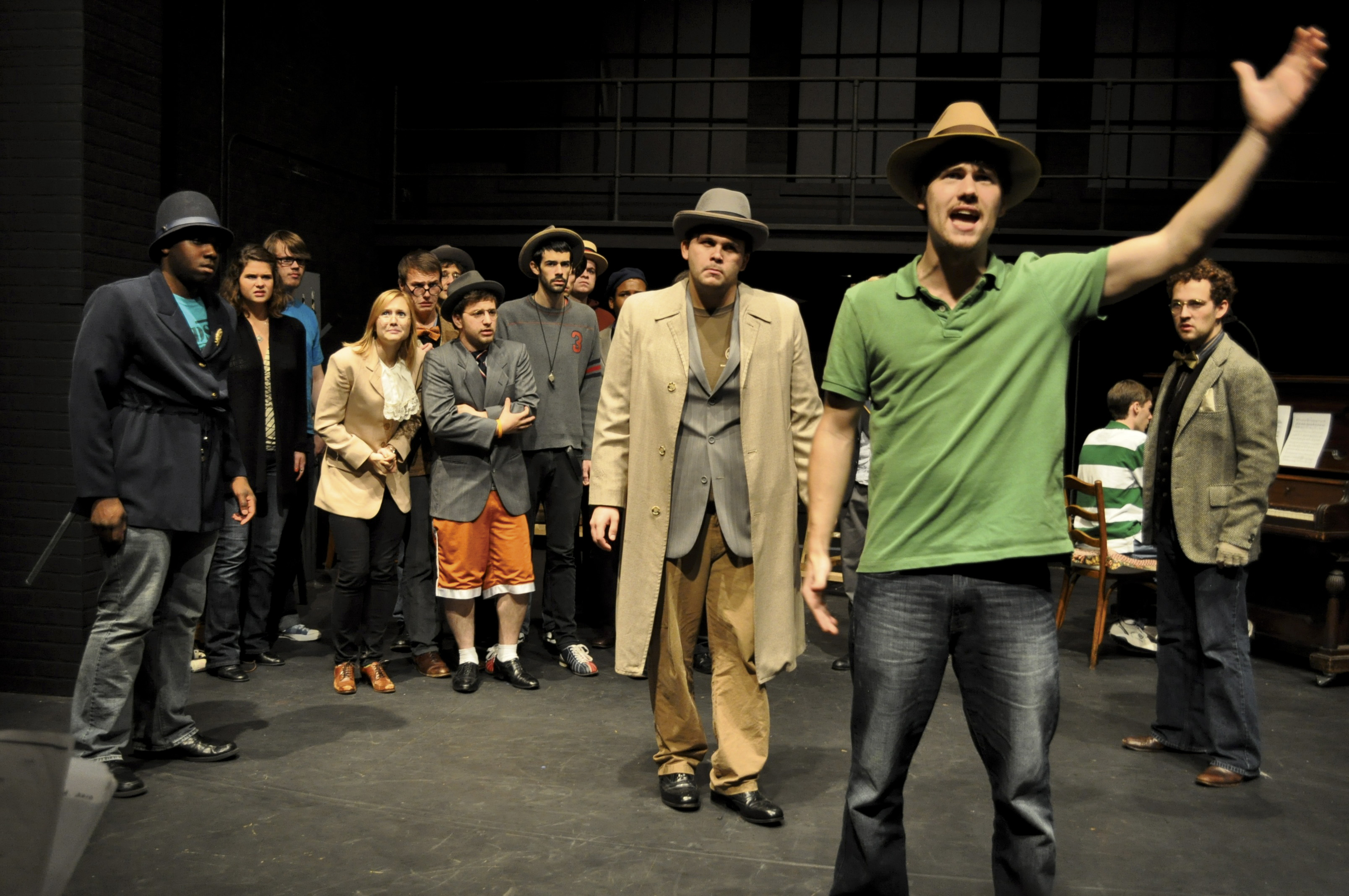
Marc Blitzstein’s labor opera “The Cradle Will Rock” rolls into Puget Sound Nov. 5, 6, 11 and 12 at 7:30 p.m. and Nov. 13 at 2 p.m. and 7:30 p.m. in the Norton Clapp Theater. Tickets are on sale now at the S.U.B. info center at $7.50 for students and $10 for general admission.
Visiting assistant professor Marilyn Bennett is directing the theater department’s fall production with a cast of 25 students consisting of theater majors, music majors and more. The play, which was originally performed in 1937, has a fantastic history of performance.
In 1937 the cast and crew were set to perform but at the last minute were prohibited from assembling and enacting the play about workers and unions in a time when the Depression and the Communist scares were evident. Thus, the cast had to make due at the Venice Theater, which was 20 blocks away from the original venue. Fortunately, the intrepid cast set off to find another theater and through their adversity “The Cradle Will Rock” was able to be performed, albeit without the proper setting, props or staging.
The original staging and costumes find their way into Puget Sound’s production of “The Cradle Will Rock.” The audience can expect not only to see the play as originally written, but also, at around ten minutes before the play, will have the privilege of seeing an added reenactment of the original theater shutdown and 20-block walk that the 1937 cast had to undergo in order to perform the show.
“We wrote in a structured improv to add to the show. The characters have to come in and discover how to act in this unknown space where they don’t have the appropriate costumes, stage, lighting or spatial orientation. In the new 10 minute play, the audience can see actors switching and swapping clothing to create their own costumes,” Director Marilyn Bennett said. “Trying to figure out how to make the play work is like one enormous 3D jigsaw puzzle that the actors have to figure out on stage, because they manage everything from their costumes to the technical aspects of the production.”
Not only does the technical structure of the play depend on the actors, but the unique ensemble structure of the play makes every one of the 25 actors an integral part of the play. In the ensemble style of acting multiple characters are on the stage at once working as a group as opposed to strikingly individual characters.
“The ensemble type of show is great. Every character is necessary; there is no real main character. Everyone contributes and everyone works together to make the show happen,” sophomore theater major Casey Oakes said.
“As an actor I enjoy the ensemble work because it gives us a chance to do a lot of variety and branch out in our acting skills,” sophomore music and French double major Brent Visser said.
The ensemble style of the play mixed with its musical aspect further lends to the play’s communal and constantly active atmosphere.
“Being a part of such an ensemble is an amazing experience and privilege. There is this great collective feeling that I haven’t really experienced with other shows I have done,” senior theater major Lauren Anderson said.
The musical aspects of the play are a constant thread running through the entire production. If there is not outright ensemble singing, then there are constant musical underpinnings throughout the dialogue.
“Music is a constant throughout the play. It’s not just written alongside the text, but it is also under and in every line,” Bennett said.
A constant feature to the music of the play is the character of the playwright, Marc Blitzstein, played by sophomore psychology and music double major Andrew Fox. Integral to the fluid and organic feel of the play is Blitzstein’s character, who acts as pianist throughout the entire show. As in the original 1937 production, Andrew Fox as Marc Blitzstein remains on stage playing all of the music on the piano for the entire play.
“The Cradle Will Rock” will make you swivel in your seat as you attempt to absorb the actions of the company of actors performing. Mirroring the original staging difficulties of the 1937 performance, the lines between audience and performers become blurred.
As the actors move along the area normally reserved for the audience in the Norton Clapp Theater, they not only interact in the sphere of the audience but they also take the audience into the play. The unique staging of this production draws the audience into the times of workers’ unions and the fight for the common man. The audience becomes a part of the play and the plot.
“Half of the fun of the play is figuring out how to do the play in an unconventional way,” senior theater major Joey Fechtel said.
“It is fun to be involved in this production and get to do theater, which I love. We have the opportunity to let the audience experience something new and feel what they don’t normally get to feel and give them meaning and show just how fun theater can be,” sophomore Tyler Harmon said.
Constantly engaging, “The Cradle Will Rock” promises to demonstrate the talent of Puget Sound students and directors in making Marc Blitzstein’s labor opera come to life and imbue the Norton Clapp Theater with the unique atmosphere of the original 1937 performance.
[PHOTO COURTESY/ JESSE BALDRIDGE]
